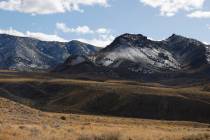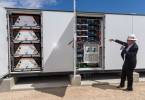Committee kills eminent domain restriction
WASHINGTON -- If the federal government already manages huge chunks of Nevada and other Western states, why should it be allowed to take even more property out of private hands to build high voltage power lines?
That was the question behind an amendment that a group of senators debated on Wednesday as they continued to form legislation to expand and upgrade the nation's electricity transmission network. It illustrated the hurdles that Congress is facing as it tries to modernize the power grid.
In the midst of an Energy and Natural Resources Committee bill drafting session, Sen. John Barrasso, R-Wyo., proposed to restrict the government's eminent domain authority in states where it controls more than 40 percent of the land.
The amendment would apply to Nevada and eight other states in the West, including California.
"There is really no need to further jeopardize private property rights," Barrasso said. "Public property is intended to serve the public. If you have a state of more than 40 percent federal land being federal land we should use public property and not eminent domain."
"Put yourself in a situation being in one of those states and they are knocking on your door and saying instead of using the big wide open spaces, we are going to ask for your property," added Sen. Lisa Murkowski, R-Ala.
Committee chairman Sen. Jeff Bingaman, D-N.M., said the amendment could unravel the bill, which aims to update the processes by which new power lines can be sited and funded.
As envisioned, the new system would bring online electricity from renewable sources in remote regions.
"I think this would be a big mistake," Bingaman said of the amendment.
"The nine states are home to significant reserves of wind and solar and geothermal. This amendment would substantially deprive that vast Western region of the opportunity to deliver those resources to major urban centers that need additional electricity."
The amendment was defeated 13-10. Barrasso said he would offer a fallback amendment that would encourage authorities to build power lines on public land wherever possible.
An amendment by Sen. Robert Menendez, D-N.J., that sought to strike eminent domain authority altogether was defeated 16-7.
Menendez argued the Senate was preparing to give too much power to the Federal Energy Regulatory Commission to override state and local property decisions.
Contact Stephens Washington Bureau Chief Steve Tetreault at stetreault @stephensmedia.com or 202-783-1760.























